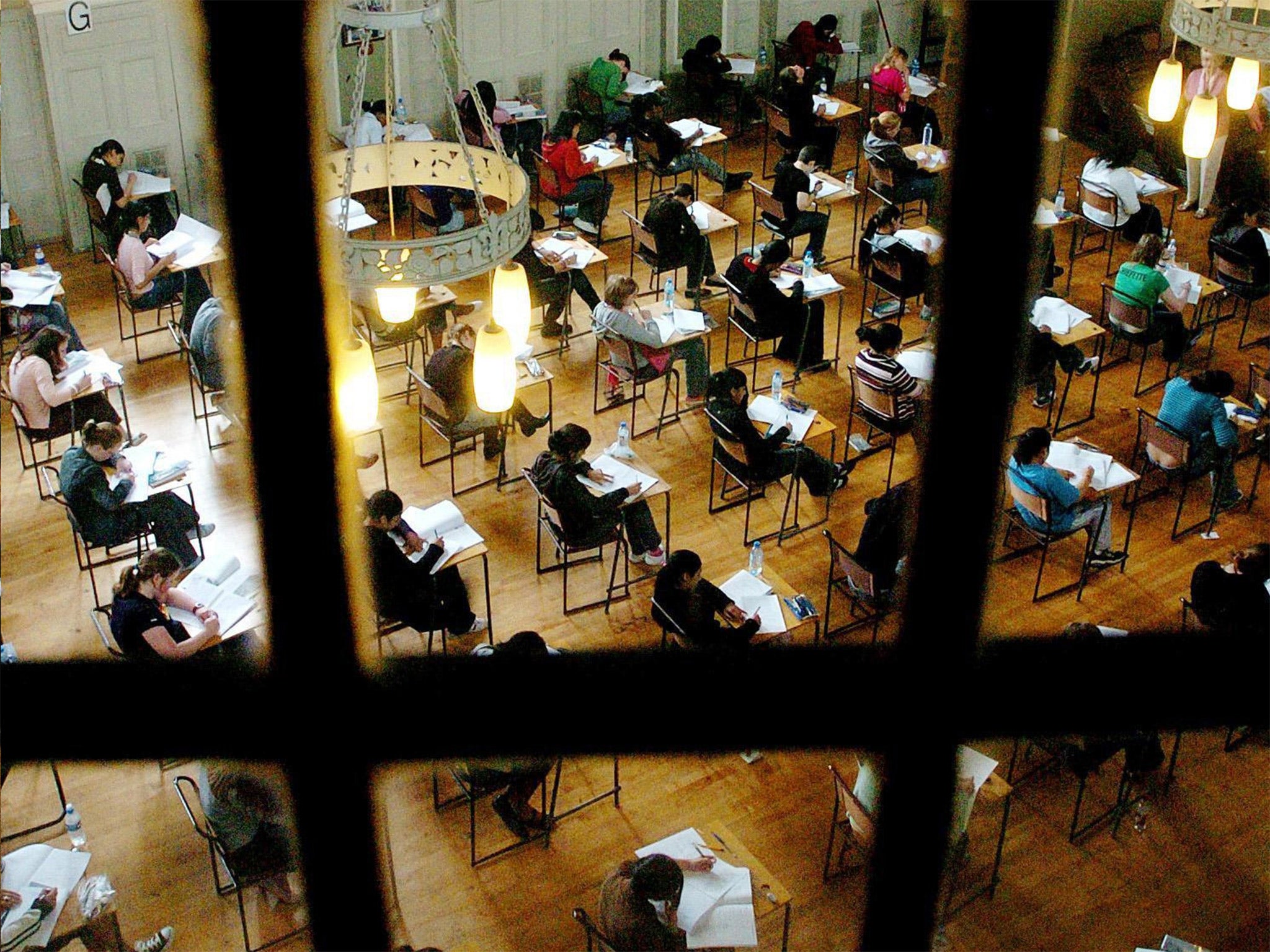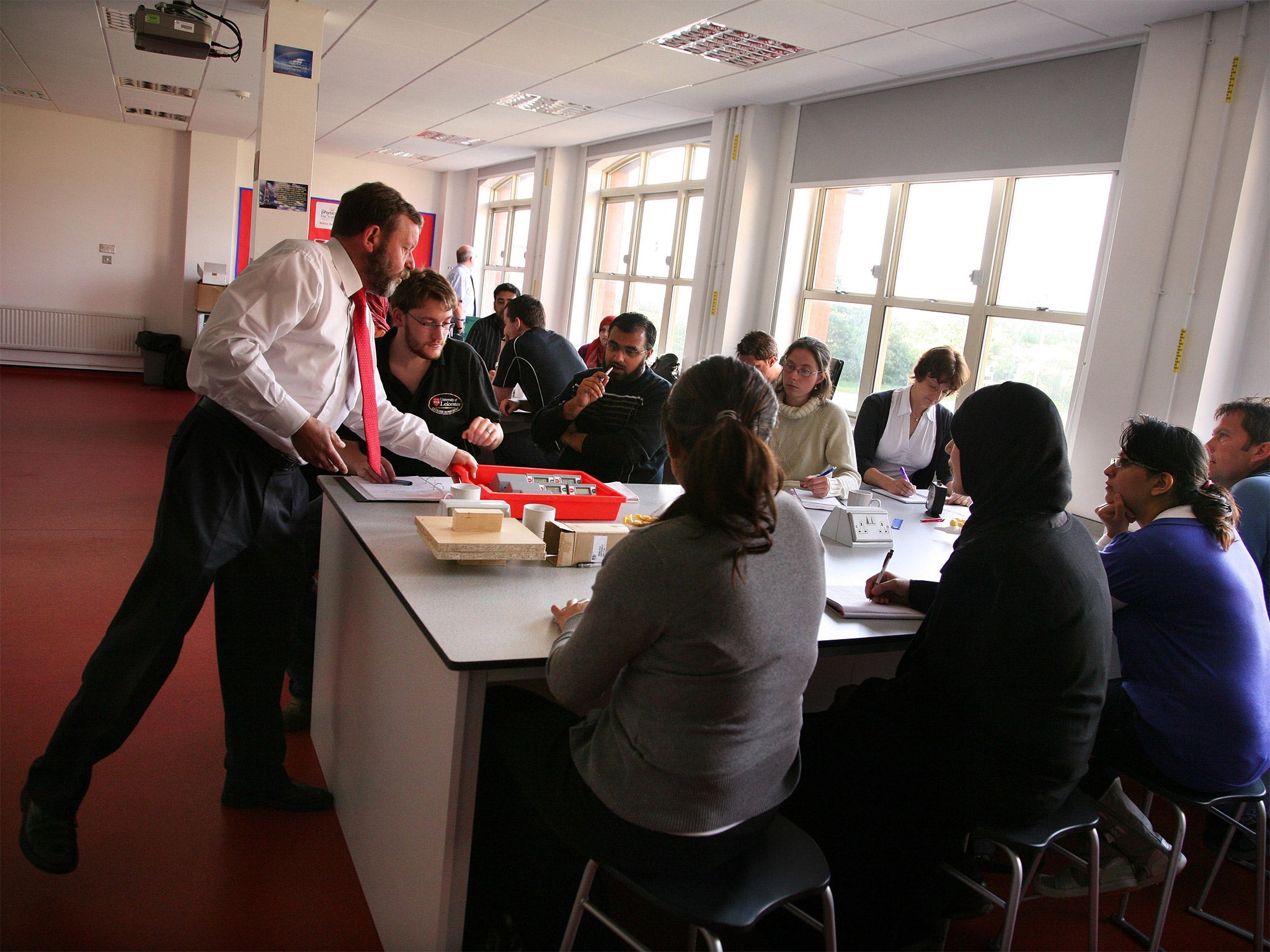Grammar schools set lower pass mark for poorer children
Schools are using two-tier testing to boost ‘poor’ admissions

Your support helps us to tell the story
From reproductive rights to climate change to Big Tech, The Independent is on the ground when the story is developing. Whether it's investigating the financials of Elon Musk's pro-Trump PAC or producing our latest documentary, 'The A Word', which shines a light on the American women fighting for reproductive rights, we know how important it is to parse out the facts from the messaging.
At such a critical moment in US history, we need reporters on the ground. Your donation allows us to keep sending journalists to speak to both sides of the story.
The Independent is trusted by Americans across the entire political spectrum. And unlike many other quality news outlets, we choose not to lock Americans out of our reporting and analysis with paywalls. We believe quality journalism should be available to everyone, paid for by those who can afford it.
Your support makes all the difference.A group of grammar schools have doubled their admission of disadvantaged pupils in a single year – by quietly setting a lower 11-plus qualification score for children from disadvantaged homes. The new two-tier pass mark – the first results of which are revealed by The Independent today – appears to represent one of the most radical and effective ever attempts to reduce the middle-class strangehold on good grammars.
Birmingham’s five state grammar schools have offered 20 per cent of their places this September to pupils from poorer homes.
This was achieved after the Foundation of the Schools of King Edward VI, which runs the five schools, set a lower qualifying score in its 11-plus test for children entitled to the “pupil premium” - ie those who have been entitled to a free school meal at some time in the past six years.
The qualifying score for the disadvantaged pupil was seven per cent lower than the score for better off pupils, on average across the five schools.
The foundation said: “We believe this is unprecedented in terms of selective schools nationally.” The foundation added that “there has been genuine concern that the grammar schools have become increasingly populated by the middle class”.
“At present the proportion of pupils on free school meals in the selective academies is four per cent whereas the percentage of pupils in Birmingham on free school meals is 36 per cent,” it said.
Ministers have long been concerned that the country’s 164 remaining grammar schools are dominated by the children of affluent families. Many better off parents hire private tutors to coach their children for the 11-plus and therefore standing a better chance of gaining admission.
To address this problem, the foundation set itself the target of ensuring 20 per cent of admissions went to children entitled to the pupil premium - double the present figure of 10 per cent.
“The foundation’s expectation was that these changes might take several years to have the desired impact but the target has been almost fulfilled in the first year,” the foundation said.
Of the five schools, Aston now has 25 per cent of its new intake entitled to the pupil premium, Five Ways and Camp Hill Boys 20 per cent and Camp Hill Girls and Handsworth have achieved 14 per cent.

“This is a major step in changing the social diversity within the selective grammar schools,” the foundation added. This was “something that is of great significance to a young and diverse - and somewhat troubled - city like Birmingham.
It is understood that idea lower qualifying score for children entitled to the pupil premium cause some controversy locally. The school had to overcome an objection lodged by a parent in order to push it through.
The Birmingham initiative, if repeated nationwide, would remove one of the major complaints by opponents of grammar schools that they offer an education only to the privileged and better off.
However, it was thought unlikely it would effect a change in attitude in any of the major political parties towards an expansion in their numbers. As one opponent observed: “It’s the testing of children at 11 and dividing them into sheep and goats that we dislike.”
The lower qualifying marks is not the only measure introduced by the schools to encourage more disadvantaged pupils to seek places.
In addition, the foundation has appointed a new Director of Outreach, former Birmingham head Pete Slough, to liaise with junior and primary schools and provide familiarisation courses for pupils dso they are better prepared for sitting the 11-plus.
The initiative goes hand in glove with moves by the two independent schools controlled by the foundation - King Edward’s (Boys) and King Edward VI High School for Girls to offer more free and assisted places to pupils from poorer backgrounds. The drive has been part financed by contributions from former alumni of the schools.
As a result, King Edward’s now has 193 of its 850 places occupied by pupils receiving a free or 90 per cent subsidised place. In King Edward VI High School for Girls, the figure is 121 out of 560.
A spokeswoman for the Department for Education said: “Our plan for education is closing the gap between rich nd poor pupils and allows thousands more pupils to go to good and outstanding schools.
“Schools are best placed to determine their admission arrangements in the interests of the local community.”
Grammar schools: The numbers
164: number of state grammar schools remaining in England.
98: number of these schools where 3 per cent or less of the children are entitled to free school meals.
16.3: percentage of pupils nationally entitled to free school meals. This amounts to about a million children.
163,000: number of children in England attending grammar schools. Wales and Scotland have no remaining state grammar schools.
24,000: number of pupils admitted to grammar schools every September after taking the 11-plus admission test.
£2.5bn: amount delivered to schools to help them educate young people entitled to the pupil premium. The premium is additional funding for publicly funded schools in England to raise the attainment of disadvantaged pupils. It is awarded for each child registered as eligible for free school meals.
Join our commenting forum
Join thought-provoking conversations, follow other Independent readers and see their replies
Comments